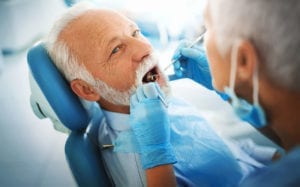Are you missing multiple teeth? Do you want to fill the gaps in your smile?
Dr. Gregory Hillyard and Dr. Alexandra Monroe restore teeth with dental bridges in Media, Pennsylvania. Dental bridges are a restorative dental solution used to replace multiple missing teeth. Bridges are one of the restorative dental care services we provide to the public.
Gaps left by missing teeth are prone to decay and other dental problems. Learn about the problems missing teeth can cause as well as the treatment process of receiving a dental bridge.

Benefits of Dental Bridges
Dental bridges:
- Restore your smile by closing gaps that lost teeth leave behind
- Properly chew and speak without having to consciously think about it
- Maintain the shape of your face
- Bite properly by distributing forces evenly with a dental bridge in place
- Prevent remaining teeth from drifting out of position
Ideal candidates for dental bridges should be missing one or more teeth, but no more than three in a row. To place a dental bridge requires healthy teeth on either side of the gap, making it a poor solution for replacing multiple teeth or full arches.
Receiving a Dental Bridge
The replacement of missing teeth with a dental bridge or implant-supported bridge begins with a thorough exam and consultation. The best possible result relies on careful treatment planning and a well-informed patient. We will put together a treatment plan that closely aligns with your unique needs, budget, and cosmetic goals.
Receiving a Temporary or Traditional Bridge
While you’re waiting for implants to heal or if you’re getting a traditional bridge, we’ll take dental impressions of the area so that the bridge can be made to fit your smile perfectly. It’s crafted in a dental lab and then sent to our office. We’ll fit the bridge to make sure that it fits your needs and works the way it should. We want to make sure you’re completely satisfied with your new restoration.
Receiving an Implant-Supported Bridge
For an implant-supported bridge, you’ll first have to get the implant posts surgically placed. You’ll then get a temporary bridge while the implants heal for about 3-6 months. This allows you to keep your smile complete until you’re ready to get the permanent restoration placed. This will be done in our office when the implant posts have fused with your jawbone.
One of the best benefits of an implant-supported bridge is the beneficial impacts dental implants can have on your oral health. They stop your jawbone from deteriorating further from your tooth loss. They fuse with the jawbone and help to spurn jawbone regeneration.
Implant-supported bridges also help you to keep your diet. You don’t have as many dietary restrictions as you do with a bridge that’s not secured by implants. Implants also help to keep the stress of supporting a bridge off of your natural teeth.
When your natural teeth are supporting a bridge, they experience increased wear and tear and may be more susceptible to issues like tooth decay. Implants are topped with dental crowns, therefore they take on the extra pressure instead of your natural teeth.
FAQs
Is a dental bridge procedure painful?
The dental bridge procedure is typically not painful. Some patients experience minor discomfort after the treatment, but this should go away within a few days. You can also minimize any discomfort with over-the-counter pain relievers. Before the procedure, your dentist will use local anesthesia to numb the area. Follow your dentist’s post-procedure instructions carefully so you can minimize any discomfort.
Who is a good candidate for a dental bridge?
A good candidate for a dental bridge is someone who has healthy teeth and gums. The candidate should also have enough bone structure to support the bridge. If you have any underlying medical conditions that could complicate the procedure, discuss them with your dentist before beginning treatment. The candidate should also have good oral hygiene habits. Dental bridges require regular cleaning and maintenance to prevent decay and gum disease.
Are dental bridges permanent?
Dental bridges are not permanent. However, they can last a long time with proper care and maintenance. Their lifespan can vary from 5 to 15 years or even longer. Longevity will depend on the materials your dentist uses, oral hygiene, and other factors. Regular dental check-ups and good oral hygiene practices can help prolong the life of a dental bridge and prevent the need for premature replacement.
How many natural teeth do you need to support a dental bridge?
To support a traditional dental bridge, you typically need at least two healthy natural teeth. These teeth serve as anchors (abutments) for the bridge. However, the exact number can depend on the type of bridge, the location of the gap, and the condition of your remaining teeth. Your dentist will evaluate these factors to determine your best course of action.
Can you sleep with a dental bridge in your mouth?
Traditional or implant-supported bridges are permanently in your mouth, and you can wear them while you sleep. However, you should remove removable bridges at night, sometimes called partial dentures.
Is it hard to eat with a dental bridge?
Eating with a dental bridge is not particularly hard. Initially, you may find it difficult due to difficulty adjusting to the feeling of having foreign objects in your mouth when chewing. As you adjust to the bridge, you’ll gradually be able to return to your normal diet. It can be helpful to eat soft foods such as yogurt or mashed potatoes. You can do this until you are comfortable eating hard foods again.
Request a Dental Exam & Consultation
Call our Media, PA office at 610.756.0649 to schedule an appointment with one of our experienced dentists. Our dental care team is dedicated to helping patients find the best dental solution for their smiles.

